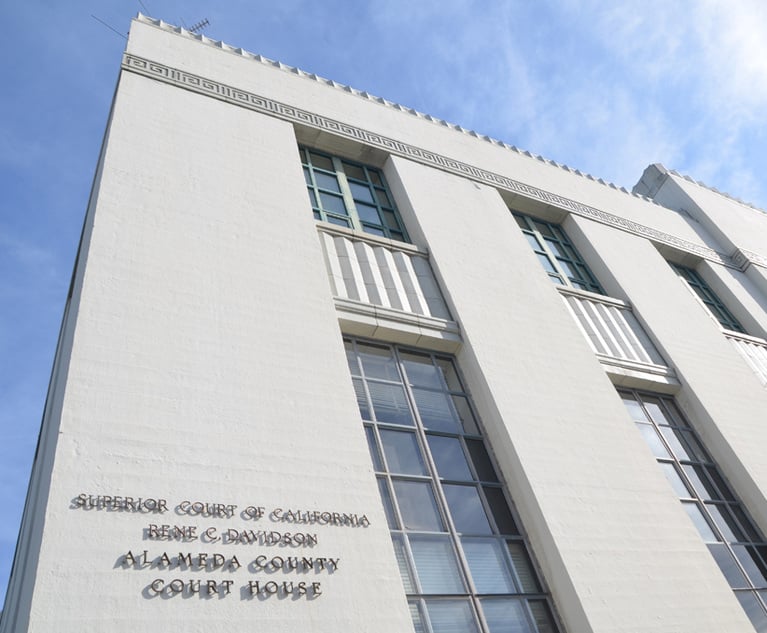Senate Scraps Bill Giving Consumers Power to Sue for Data-Privacy Violations
The bill had been targeted by the California Chamber of Commerce, the Internet Association and other tech trade lobbies that said the changes would have encouraged litigation instead of compliance.
May 16, 2019 at 05:42 PM
3 minute read
 Sacramento State Capitol building on Capitol Way. Credit: Jason Doiy/The Recorder
Sacramento State Capitol building on Capitol Way. Credit: Jason Doiy/The Recorder
A measure to give state residents the right to sue for violations of the new California Consumer Privacy Act died in a state legislative fiscal committee Thursday amid opposition from business and tech groups.
Senate Bill 561, sponsored by Attorney General Xavier Becerra, did not receive a vote in the Senate Appropriations Committee, effectively blocking the bill from moving past a procedural deadline.
In addition to creating a private right of action, which Becerra said would be key to the new law's enforcement, the bill would have dropped language requiring the attorney general to counsel companies on how to comply with the act. It would also have eliminated a 30-day right-to-cure period for alleged violators.
“This was a major setback for California's privacy rights,” the bill's author, Sen. Hannah-Beth Jackson, D-Santa Barbara, said in a statement that expressed her disappointment. “I remain committed to ensuring California's privacy protections are preserved and strengthened.”
The bill had been targeted by the California Chamber of Commerce, the Internet Association and other tech trade lobbies that said the changes would have encouraged litigation instead of compliance.
The Consumer Privacy Act “is stronger with unified, well-funded enforcement through the California Attorney General's office,” Kevin McKinley, director of the Internet Association's California operations, said in a statement. “The internet industry will keep working with policymakers and other stakeholders to ensure the AG's office is resourced to protect consumers, enforce the CCPA effectively, and provide both large and small businesses the guidance they'll need to comply with the law.”
The new law allows consumers to sue for Consumer Privacy Act violations in limited instances surrounding data breaches. Otherwise, only the Attorney General's Office can bring enforcement actions, a responsibility that Becerra has said he cannot fully take on without significantly more staffing and funding.
“I don't think the Legislature wants only the Attorney General's Office to be able to protect people's rights,” Becerra told reporters in February when he endorsed SB 561. “We need to have some help.”
Becerra's office did not respond to a message seeking comment on Thursday.
The Consumer Privacy Act, slated to go into effect next year, will require companies to disclose what information they've collected about consumers and will give those consumers more control over what happens with that data.
Lawmakers this year have introduced a handful of bills aimed at limiting the law's reach, including measures to allow data collection for customer loyalty programs and to restrict the definition of personal information that can be shared. Floor votes on those bills are expected over the next two weeks.
Read more:
California Lawmakers Embrace Limits on New Data Privacy Law
What Big Law, Tech Leaders Say About California's New Data-Privacy Law
Let Consumers Sue Under New Data Privacy Law, Becerra's Office Says
Business Groups Lobby for Changes to California Data Privacy Law
This content has been archived. It is available through our partners, LexisNexis® and Bloomberg Law.
To view this content, please continue to their sites.
Not a Lexis Subscriber?
Subscribe Now
Not a Bloomberg Law Subscriber?
Subscribe Now
NOT FOR REPRINT
© 2025 ALM Global, LLC, All Rights Reserved. Request academic re-use from www.copyright.com. All other uses, submit a request to [email protected]. For more information visit Asset & Logo Licensing.
You Might Like
View All

Fresh lawsuit hits Oregon city at the heart of Supreme Court ruling on homeless encampments
4 minute read

Trending Stories
- 1Uber Files RICO Suit Against Plaintiff-Side Firms Alleging Fraudulent Injury Claims
- 2The Law Firm Disrupted: Scrutinizing the Elephant More Than the Mouse
- 3Inherent Diminished Value Damages Unavailable to 3rd-Party Claimants, Court Says
- 4Pa. Defense Firm Sued by Client Over Ex-Eagles Player's $43.5M Med Mal Win
- 5Losses Mount at Morris Manning, but Departing Ex-Chair Stays Bullish About His Old Firm's Future
Who Got The Work
J. Brugh Lower of Gibbons has entered an appearance for industrial equipment supplier Devco Corporation in a pending trademark infringement lawsuit. The suit, accusing the defendant of selling knock-off Graco products, was filed Dec. 18 in New Jersey District Court by Rivkin Radler on behalf of Graco Inc. and Graco Minnesota. The case, assigned to U.S. District Judge Zahid N. Quraishi, is 3:24-cv-11294, Graco Inc. et al v. Devco Corporation.
Who Got The Work
Rebecca Maller-Stein and Kent A. Yalowitz of Arnold & Porter Kaye Scholer have entered their appearances for Hanaco Venture Capital and its executives, Lior Prosor and David Frankel, in a pending securities lawsuit. The action, filed on Dec. 24 in New York Southern District Court by Zell, Aron & Co. on behalf of Goldeneye Advisors, accuses the defendants of negligently and fraudulently managing the plaintiff's $1 million investment. The case, assigned to U.S. District Judge Vernon S. Broderick, is 1:24-cv-09918, Goldeneye Advisors, LLC v. Hanaco Venture Capital, Ltd. et al.
Who Got The Work
Attorneys from A&O Shearman has stepped in as defense counsel for Toronto-Dominion Bank and other defendants in a pending securities class action. The suit, filed Dec. 11 in New York Southern District Court by Bleichmar Fonti & Auld, accuses the defendants of concealing the bank's 'pervasive' deficiencies in regards to its compliance with the Bank Secrecy Act and the quality of its anti-money laundering controls. The case, assigned to U.S. District Judge Arun Subramanian, is 1:24-cv-09445, Gonzalez v. The Toronto-Dominion Bank et al.
Who Got The Work
Crown Castle International, a Pennsylvania company providing shared communications infrastructure, has turned to Luke D. Wolf of Gordon Rees Scully Mansukhani to fend off a pending breach-of-contract lawsuit. The court action, filed Nov. 25 in Michigan Eastern District Court by Hooper Hathaway PC on behalf of The Town Residences LLC, accuses Crown Castle of failing to transfer approximately $30,000 in utility payments from T-Mobile in breach of a roof-top lease and assignment agreement. The case, assigned to U.S. District Judge Susan K. Declercq, is 2:24-cv-13131, The Town Residences LLC v. T-Mobile US, Inc. et al.
Who Got The Work
Wilfred P. Coronato and Daniel M. Schwartz of McCarter & English have stepped in as defense counsel to Electrolux Home Products Inc. in a pending product liability lawsuit. The court action, filed Nov. 26 in New York Eastern District Court by Poulos Lopiccolo PC and Nagel Rice LLP on behalf of David Stern, alleges that the defendant's refrigerators’ drawers and shelving repeatedly break and fall apart within months after purchase. The case, assigned to U.S. District Judge Joan M. Azrack, is 2:24-cv-08204, Stern v. Electrolux Home Products, Inc.
Featured Firms
Law Offices of Gary Martin Hays & Associates, P.C.
(470) 294-1674
Law Offices of Mark E. Salomone
(857) 444-6468
Smith & Hassler
(713) 739-1250






